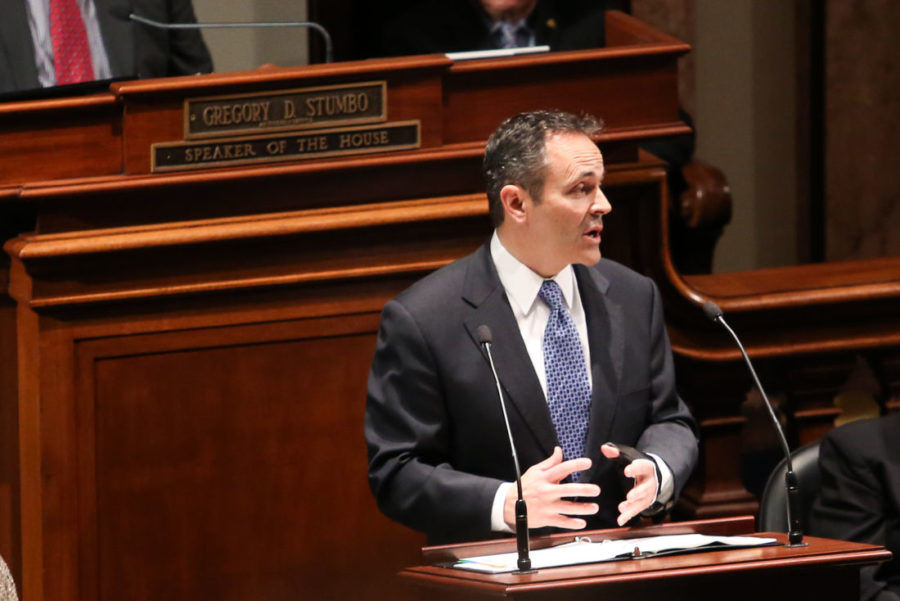Stop tuition increases
April 20, 2016
There’s been a trend in recent years of looking at higher education through the eyes of an economist, comparing higher education to an investment.
However useful this analogy is, people should remember that students are not investors, and providing higher education should not be a money-making venture.
Still, money is at the forefront of the issues for higher education, and it has been plastered all across Kentucky media since Gov. Matt Bevin announced 9 percent cuts to higher education in January. This has since been reduced to a 4.5 percent cut, which will take place in the next fiscal year.
Leading economists at UK believe this will lead to tuition increases.
“I would expect tuition to increase even without the budget cuts,” said Kenneth Troske, senior associate dean in the Gatton College of Business and Economics.
Moreover, analyzing state appropriations and enrollment suggests that tuition will need to increase at a higher rate than last year, assuming other factors stay constant.
But few are willing to question the consistency of those ‘other factors,’ and although it sounds perfectly reasonable that UK needs to offset decreases in state support, this isn’t strongly supported.
The university’s finances are booming — credit upgrades, growing revenue on many fronts, and tripling of cash and cash equivalents within three years – so why must UK keep raising tuition for students?
If the rising costs went toward a growing collection of top-notch faculty, no one would complain. But this is not the case.
Troske said the Gatton College has seen more adjunct faculty and an increasing student to faculty ratio.
“That means bigger classes. There’s evidence to suggest that bigger classes hurt students’ ability to succeed and finish, and it’s certainly the case that it’s harder to get into classes — and that can slow students down from finishing,” Troske said. “None of those are good things.”
According to UK professor of economics Chris Bollinger, UK has many new expenditures in the past decade which are in need of funds.
“Some of the things that we’re doing with that extra money are important, … like the Graham Career Center, the placement center for the entire university, … and we’ve added things like Mathskeller,” Bollinger said. “There are some other things that have had to be added that I’m not as convinced personally that they’re valuable. For example, we now have a much larger internal statistics tracking, number-crunching group than we had (in the past).”
Bollinger said a big driver of this increase is due to more stringent regulations from accreditation agencies.
“Maybe some of that stuff isn’t really our mission? Maybe some of that stuff is a lot of work for not a lot of real benefit to the students? Great discussions can be had about that,” he said.
The Kentucky Kernel’s contribution to that discussion is that costs for higher education need to stop rising, one way or another. As far as tuition goes, something must be done to keep costs down – even if it means halting non-academic growth or cutting things like internal analytics, administrative payroll or capital projects.
No one wanted budget cuts, but now the university is unfortunately forced to raise revenue or restrict expenditures. The first priorities for higher education should be quality and accessibility, and since instructional quality has been sacrificed despite increased tuition in recent years, the choice is clear — reduce expenses.
UK students from across campus agree.
“I do think (tuition increases) is a problem,” said Josh Carroll, a computer engineering freshman. “I think it’s just a huge barrier to entry for going to a college.”
Ines Elena, a freshman international student double majoring in psychology and communication, said tuition increases will probably keep students from coming to UK from her home country, Spain.
“We have a really good education here, and I think that right now we pay for what we have. I don’t know if it increases, is (UK) going to stay the same or is it going to get better?” she said.
Anna Zeek, an out-of-state pre-nursing freshman, was upset to hear that out-of-state students have been seeing higher increases in tuition.
“Increasing tuition makes it a lot harder for me to want to come here — as much as I love UK — just because of the overall costs and being able to afford UK is difficult … I feel like I’m being cheated.”
Email opinions@kykernel.com

























































































































































